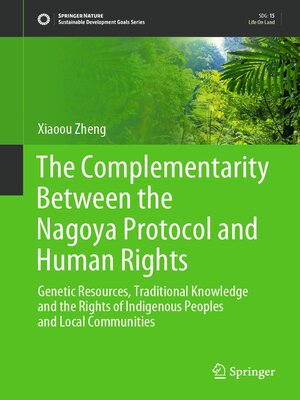The Complementarity Between the Nagoya Protocol and Human Rights
ebook ∣ Genetic Resources, Traditional Knowledge and the Rights of Indigenous Peoples and Local Communities · Sustainable Development Goals Series
By Xiaoou Zheng

Sign up to save your library
With an OverDrive account, you can save your favorite libraries for at-a-glance information about availability. Find out more about OverDrive accounts.
Find this title in Libby, the library reading app by OverDrive.



Search for a digital library with this title
Title found at these libraries:
| Library Name | Distance |
|---|---|
| Loading... |
This book studies the questions of how and to what extent the Nagoya Protocol on Access and Benefit-Sharing (ABS) can be interpreted and implemented in light of international human rights law, with a sharpened focus on Indigenous Peoples and local communities. The complementarity thesis is built upon the understanding that ABS and human rights should not and cannot be isolated from one another in order to achieve their respective objectives. A mutually supportive approach to these two bodies of international law is articulated throughout the chapters, covering a wide range of international treaties and 'soft' instruments, as well as the practices of the United Nations, international treaty bodies, courts, other international organizations and sometimes NGOs. Legal researchers, legislators and policymakers, human rights practitioners and indeed anyone interested in the development of a more coherent and integrated system of international ABS framework will find this book helpful, with its succinct coverage of current ABS and human rights laws and practices, their pragmatic implications and possible ways of integration forward.







